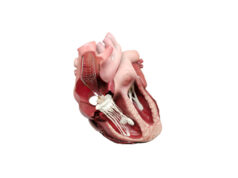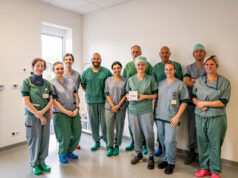NaviGate Cardiac Structures has announced that a novel valved stent that can capture the enlarged annulus in patients with functional tricuspid regurgitation was successfully implanted in a patient with massive incompetence of the tricuspid valve. The company reports that after the implantation, the valve demonstrated excellent valvular function, indicating correction of the massive regurgitation problem.
The patient, a 64-year-old female with an extensive history of severe tricuspid regurgitation was successfully treated with the GATE tricuspid atrioventricular valved stent (NaviGate Cardiac Structures). The cardiac team from the Cleveland Clinic implanted the stent with catheter-guided technique under a compassionate plea from the patient. The patient became stable and was closely observed by the cardiac team and at 30 days post implantation is doing quite well.
Jose L Navia (Cleveland Clinic, Cleveland, USA), who serves as a scientific advisory board member to NaviGate, comments: “This is a step forward in the treatment of tricuspid regurgitation. The hope is to provide a device that is able to capture the diseased tricuspid valve annulus, which has been enlarged inordinately by the ravages of functional tricuspid regurgitation, thus causing a reverse flow of venous blood from the right heart that should go to the lungs.”
A press release reports that the GATE tricuspid stent has been developed and manufactured by NaviGate Cardiac Structures, which licensed the seminal technology from Cleveland Clinic. The technology platform, initially explored at Cleveland Clinic, includes percutaneous valve devices for mitral valve replacement and tissue-preservation techniques that remove the toxic tissue fixatives, which—although allowing the fabrication of biological valve replacement from animal tissues—leaves residuals that are thought to promote untoward effects for the longevity of tissue. The technology removes most of the water so that the device can be shipped in the “dry form.”
The press release adds that the company made modifications to the device that differentiates it from all others presently manufactured for atrioventricular valves. It says that the unique design of this device in the form of a diffuser or truncated cone exhibits a low-height profile that can be more easily threaded through the vasculature to reach the atrioventricular valves, allowing it to reside without protrusion into either of the adjacent chambers (atrium or ventricle) for mitral or tricuspid valves.
NaviGate Cardiac Structures is presently conducting clinical trials of its NAVI mitral valved stent for correction of functional mitral regurgitation. One patient in Chile has just passed the one-year mark and returned to work with a functional valve.











